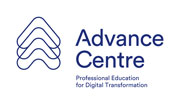
Barry Twomey
Director, Advance Centre
Upskill in digital with flexible, subsidised micro-credentials. Gain AI, data and automation skills to stay ahead in Ireland’s evolving workforce.
The Advance Centre was created through Human Capital Initiative (HCI) Pillar 3 funding from the Higher Education Authority (HEA) in late 2020. The project is one of 24 initiatives supporting skill development across Irish HEIs, focusing on digital transformation and promoting lifelong learning through policy evolution and upskilling.
Multidisciplinary approach to digital transformation
Digital transformation is the integration of digital technologies into all areas of the working environment to create fundamental changes in how everything operates. Digital transformation education is by its very nature multidisciplinary, with the need for both general data skills and, more recently, a focus on AI skills as well as relevant sectoral context.
Digital upskilling challenges
Upskilling in digital transformation comes with many challenges for the employer and employee. One of these challenges is the availability of part-time training. Another challenge is identifying the skills gaps and how to address them. Stating that there is a skills gap in data analytics is too narrow in focus.
For Intel Sr Principal Engineer and Higher Education Strategy Team Chair Kenny McNamee: “A key component in continuing to deliver leading-edge advanced technologies is the adoption and integration of AI in manufacturing to optimise processes with improved data analysis and decision-making to reduce costs and improve product quality.”
Upskilling in digital transformation
comes with many challenges for
the employer and employee.
Expanding data upskilling initiatives
Working with highly automated processes, the amount of data generated and used to make decisions is vast. The data challenge is a mixture of managing data projects (setup); developing the data models to process the data (execute); and reviewing and stress-testing the data models to ensure the efficacy of the results from these models (verify).
While these functions share commonalities, they are distinct skills. Over 50 Intel staff, along with learners from other backgrounds, took three micro-credential courses in blended or online formats. Feedback was positive, with employees applying their learning directly to projects. Next steps include expanding micro-credential upskilling and exploring further opportunities for graduates.
Flexible accreditation
A 12-week micro-credential differs from shorter CPD courses by allowing for greater depth. This is a key requirement for QQI (Quality and Qualifications Ireland) accreditation. Credits reflect the learning level and can be stacked toward higher qualifications, from certificates to master’s degrees, completed part-time.
The Advance Centre’s flexible study options allow learners to upskill in an agile and cost-effective way, especially since the introduction of the HCI Pillar 3 learner fee subsidy, which allows learners to avail of an up to 80% discount on course fees.
Further details can be found at: advancecentre.ie/learnerfeesubsidy and microcreds.ie



